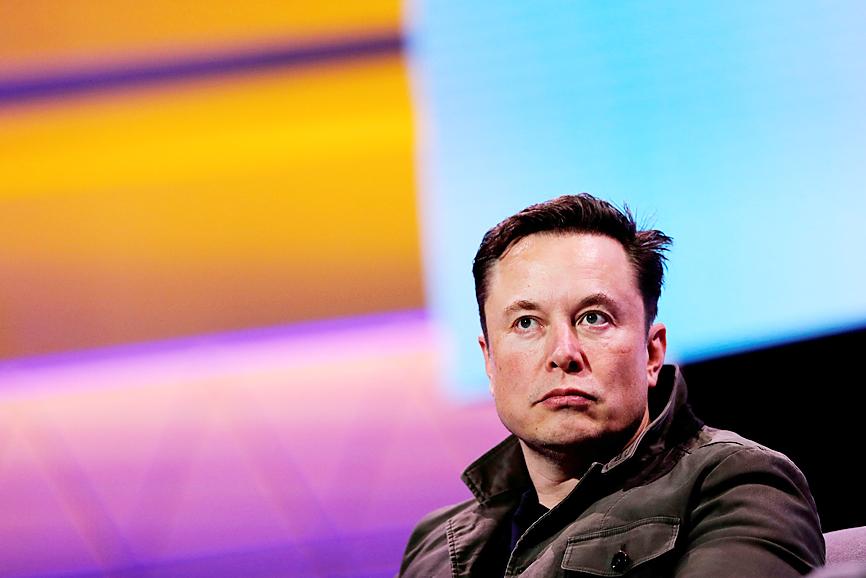Elon Musk’s start-up devoted to meshing brains with computers was on Friday closer to its dream, having gotten a monkey to play the video game Pong using only its mind.
Musk has long contended that merging minds with machines is vital if people are going to avoid being outpaced by artificial intelligence.
A video posted on YouTube by the entrepreneur’s Neuralink Corp start-up showed a macaque named Pager playing Pong by essentially using thought to move paddles that bounce digital balls back and forth onscreen.

Photo: Reuters
“To control his paddle, Pager simply thinks about moving his hand up or down,” a voice narrating the video said. “As you can see, Pager is amazingly good at MindPong.”
Neuralink devices were implanted on two sides of Pager’s brain to sense neuron activity, then the monkey played the game a few minutes using a joystick to let software figure out the signals associated with hand movements.
Pager’s reward was banana smoothly served through a straw when he successfully batted the digital ball from one paddle to the other, according to the demonstration.
After a few minutes, the “decoder” program figured out what neuron signals to look for and the joystick was no longer needed to play the game.
“A monkey is literally playing a video game telepathically using a brain chip!!” Musk wrote on Twitter.
The decoder could be calibrated to enable a person to guide a cursor on a computer screen, potentially letting them type e-mails, text messages or browse the Internet just by thinking, a blog post at neuralink.com said.
“Our first goal is to give people with paralysis their digital freedom back,” the Neuralink team said in the post.
Members of the team last year shared a “wish list” that ranged from technology returning mobility to the paralyzed and sight to the blind, to enabling telepathy and the uploading of memories for later reference — or perhaps to be downloaded into replacement bodies.
For now, Neuralink is being tested on animals with the team working on the potential for clinical trials.
With the help of a surgical robot, a piece of the skull is replaced with a Neuralink disk, and its wispy wires are strategically inserted into the brain, a previous demonstration showed.
The disk registers nerve activity, relaying the information via common Bluetooth wireless signal to a device such as a smartphone, Musk said.
“It actually fits quite nicely in your skull. It could be under your hair and you wouldn’t know,” he said.
Experts and academics remain cautious about his vision of symbiotically merging minds with super-powered computing.

Taiwan Semiconductor Manufacturing Co (TSMC, 台積電), the world’s biggest contract chipmaker, booked its first-ever profit from its Arizona subsidiary in the first half of this year, four years after operations began, a company financial statement showed. Wholly owned by TSMC, the Arizona unit contributed NT$4.52 billion (US$150.1 million) in net profit, compared with a loss of NT$4.34 billion a year earlier, the statement showed. The company attributed the turnaround to strong market demand and high factory utilization. The Arizona unit counts Apple Inc, Nvidia Corp and Advanced Micro Devices Inc among its major customers. The firm’s first fab in Arizona began high-volume production

VOTE OF CONFIDENCE: The Japanese company is adding Intel to an investment portfolio that includes artificial intelligence linchpins Nvidia Corp and TSMC Softbank Group Corp agreed to buy US$2 billion of Intel Corp stock, a surprise deal to shore up a struggling US name while boosting its own chip ambitions. The Japanese company, which is adding Intel to an investment portfolio that includes artificial intelligence (AI) linchpins Nvidia Corp and Taiwan Semiconductor Manufacturing Co (TSMC, 台積電), is to pay US$23 a share — a small discount to Intel’s last close. Shares of the US chipmaker, which would issue new stock to Softbank, surged more than 5 percent in after-hours trading. Softbank’s stock fell as much as 5.4 percent on Tuesday in Tokyo, its

COLLABORATION: Softbank would supply manufacturing gear to the factory, and a joint venture would make AI data center equipment, Young Liu said Hon Hai Precision Industry Co (鴻海精密) would operate a US factory owned by Softbank Group Corp, setting up what is in the running to be the first manufacturing site in the Japanese company’s US$500 billion Stargate venture with OpenAI and Oracle Corp. Softbank is acquiring Hon Hai’s electric-vehicle plant in Ohio, but the Taiwanese company would continue to run the complex after turning it into an artificial intelligence (AI) server production plant, Hon Hai chairman Young Liu (劉揚偉) said yesterday. Softbank would supply manufacturing gear to the factory, and a joint venture between the two companies would make AI data

The Taiwan Automation Intelligence and Robot Show, which is to be held from Wednesday to Saturday at the Taipei Nangang Exhibition Center, would showcase the latest in artificial intelligence (AI)-driven robotics and automation technologies, the organizer said yesterday. The event would highlight applications in smart manufacturing, as well as information and communications technology, the Taiwan Automation Intelligence and Robotics Association said. More than 1,000 companies are to display innovations in semiconductors, electromechanics, industrial automation and intelligent manufacturing, it said in a news release. Visitors can explore automated guided vehicles, 3D machine vision systems and AI-powered applications at the show, along